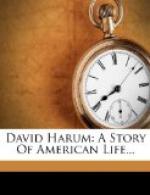“No,” said John, smiling, “I can’t say that I have, but I know something about the subject in a general way, and there is no fear of your tiring me out.”
“All right,” proceeded David. “As I was sayin’, I got another equine wonder an’ fifteen dollars to boot fer my old plug, an’ it wa’n’t a great while before I was in the hoss bus’nis to stay. After between two an’ three years I had fifty or sixty hosses an’ mules, an’ took all sorts of towin’ jobs. Then a big towin’ concern quit bus’nis, an’ I bought their hull stock an’ got my money back three four times over, an’ by the time I was about twenty-one I had got ahead enough to quit the canal an’ all its works fer good, an’ go into other things. But there was where I got my livin’ after I run away f’m Buxton Hill. Before I got the job of lock-tendin’ I had made the trip to Albany an’ back twice—’walkin’ my passage,’ as they used to call it, an’ I made one trip helpin’ steer, so ’t my canal experience was putty thorough, take it all ’round.”
“It must have been a pretty hard life,” remarked John.
David took out his penknife and proceeded to impale his cigar upon the blade thereof. “No,” he said, to John’s proffer of the box, “this ’ll last quite a spell yet. Wa’al,” he resumed after a moment, in reply to John’s remark, “viewin’ it all by itself, it was a hard life. A thing is hard though, I reckon, because it’s harder ‘n somethin’ else, or you think so. Most things go by comparin’. I s’pose if the gen’ral run of trotters never got better ’n three ’n a half that a hoss that c’d do it in three ’d be fast, but we don’t call ’em so nowdays. I s’pose if at that same age you’d had to tackle the life you’d ‘a’ found it hard, an’ the’ was hard things about it—trampin’ all night in the rain, fer instance; sleepin’ in barns at times, an’ all that; an’ once the cap’n o’ the boat got mad at somethin’ an’ pitched me head over heels into the canal. It was about the close of navigation an’ the’ was a scum of ice. I scrambled out somehow, but he wouldn’t ‘a’ cared if I’d ben drownded. He was an exception, though. The canalers was a rough set in gen’ral, but they averaged fer disposition ‘bout like the ord’nary run o’ folks; the’ was mean ones an’ clever ones; them that would put upon ye, an’ them that would treat ye decent. The work was hard an’ the grub wasn’t alwus much better ‘n what you—he, he, he!—what you ben gettin’ at the Eagle” (John was now by the way of rather relishing jokes on that subject); “but I hadn’t ben raised in the lap o’ luxury—not to any consid’able extent—not enough to stick my nose up much. The men I worked fer was rough, an’ I got my share of cusses an’ cuffs, an’ once in a while a kick to keep up my spirit of perseverance; but, on the hull, I think I got more kindness ‘n I did at home (leavin’ Polly out), an’ as fer gen’ral treatment, none on ’em c’d come up to my father, an’ wuss yet, my oldest brother ’Lish. The cap’n that throwed me overboard was the wust, but alongside




